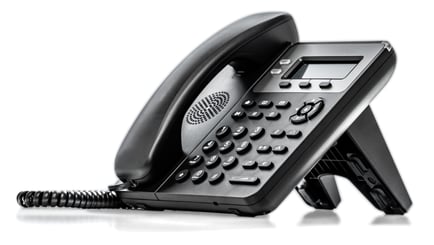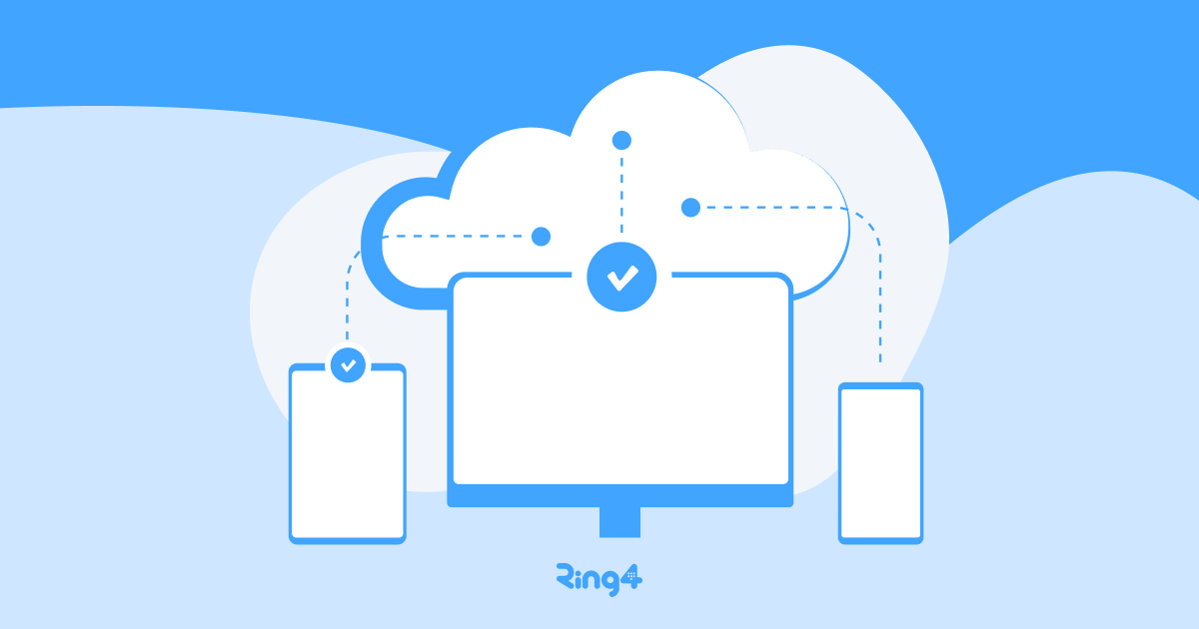There are multiple options when it comes to choosing a phone system for your business. Many brands are transitioning to the use of internet phone solutions to support remote teams and flexible communication. If you prefer to conduct business without the constraints of a physical phone system, you may consider a hosted or cloud-based solution instead.
The question is though, what are the differences between hosted phone systems and cloud-based solutions, if any? In this article, we will explore key features and comparisons to help you choose the best option for your business.
Key Differences Between Hosted and Cloud Phone Systems
The terms “hosted” (business VoIP) and "cloud phone system" are often used interchangeably, but they do have some minor differences.
Business VoIP, also known as Internet-based VoIP, is a broad term that refers to a range of services that allow businesses to make and receive phone calls over the internet. Cloud phone systems, on the other hand, are a type of business VoIP that utilizes cloud technology to power its phone service.
One key comparison between these two types of phone systems is the way they are set up and managed. A traditional phone system is a physical PBX system that is installed and self-managed on-site. This means that the hardware and infrastructure are owned and maintained by the business, which can be costly and time-consuming.

In contrast, a cloud phone system is hosted and managed remotely by a third-party provider. This means that businesses can access their phone system and make and receive calls over the internet, without the need for on-site hardware.
When it comes to billing, a hosted or cloud-based phone system is typically billed on a pay-as-you-go basis, with no upfront costs and more flexible pricing options.
In terms of technical features and capabilities, both hosted and cloud phone systems offer a range of options, such as call routing, voicemail, and conference calling. However, cloud phone systems often offer more advanced features, such as virtual receptionists and integration with other business tools. Additionally, cloud phone systems are backed by the provider's servers, which are typically more reliable and have higher uptime than on-site systems.
Both a hosted and cloud-based phone system allows businesses to access calls and communicate from anywhere with an internet connection. This makes it easier for businesses with remote employees or multiple locations to stay connected.
Overall, the choice between a hosted and cloud phone system will depend on a business's specific needs and budget.
Hosted and Cloud-Based Vs Traditional Phone Systems
Hosted and cloud-based phone systems have become increasingly popular in recent years as businesses look for more flexible and scalable alternatives to traditional phone systems. In this section, we will compare the key differences between hosted or cloud-based phone systems and traditional phone systems.
Scalability
One of the main advantages of a hosted or cloud-based phone system is the ability to easily scale up or down to meet changing business needs. This is in contrast to traditional phone systems, which require the purchase of additional hardware and infrastructure to support an expanding business.
Features and Capabilities
Both hosted and cloud-based phone systems offer a range of advanced features, such as:
- Call forwarding
- Voicemail
- Conference calling
- Business app integrations
- Messaging
Traditional phone systems often lack these capabilities. In some if not most cases, they require additional hardware and software to access them.
Reliability
Hosted and cloud-based phone systems are backed by the provider's servers, which are typically more reliable and have higher uptime than traditional on-site systems. This means that businesses can trust that their phone system will be available and working when they need it.
Cost
Another key difference between the three types of phone systems is the cost to install and maintain them. Hosted and cloud-based phone systems are typically billed on a pay-as-you-go basis, with no upfront costs and more flexible pricing options. In contrast, traditional phone systems require a larger upfront investment in hardware and infrastructure, as well as ongoing maintenance and support costs.
Flexibility
Hosted and cloud-based phone systems offer greater flexibility and mobility than traditional phone systems. Because they are used over the internet, businesses can access their phone system from anywhere with a wireless connection. Traditional phone systems, on the other hand, are tied to a specific location and require on-site hardware to function.
Who needs a hosted or cloud-based phone system?
Hosted and cloud-based phone systems are ideal for businesses that want to access advanced features and scalability without the need for on-site hardware and infrastructure. These systems are also well-suited for businesses with remote employees or multiple locations, as they allow for easy access and connectivity from anywhere.
Other Considerations When Comparing Hosted, Cloud, and Traditional Phone Systems
When it comes to choosing a phone system, it's important to consider the differences between traditional, hosted, and cloud-based systems to gain an understanding of which option is best suited for your business.
Traditional phone systems require on-site equipment, which can be expensive and time-consuming to set up and maintain. They also don’t allow the flexibility of answering calls on the go or managing large remote teams.
Hosted and cloud-based systems are ideal for organizations seeking a low-cost setup and easy management. Pricing is flexible, which allows business owners to increase or decrease add-on services as needed.

Final Thoughts
In conclusion, the differences between hosted and cloud-based phone systems are minimal. They both allow businesses to communicate through calls and messages over an internet connection, without the need for on-site hardware. When both of these options are compared to traditional phone systems, they offer much more control and customization.
Hosted and cloud-based phone systems are cost-effective and support more of the features that modern businesses require to communicate effectively, both internally and externally.
There are several reputable providers that market their services as hosted, cloud-based, or both. Ultimately, the best choice for your business will depend on your specific needs, budget, and preferences.
If you’re interested in learning about Ring4’s online business phone system, you may find that it meets all of your phone needs without requiring additional software, hardware, or uptime! Click here to try Ring4 for free.
